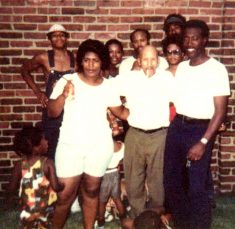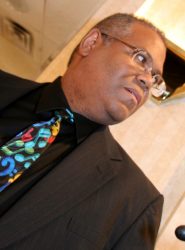Colored?
Posted by Mitch Mitchell on Oct 19, 2016
(I originally wrote this in 2003 as one of my newsletters. It was seen by a member of the Workforce Diversity Network, who asked me if they could reprint it on their site at the time. At some point they removed the article as a true link and turned it into a pdf, which is fine and good except now no one can read it unless they know about the organization and the link. Therefore, this is a reprint of myself, because even though it's from 13 years ago, it seems relevant again based on what's going on in the United States right now.)
 |
Colored?
Colored.
I keep running this word through my mind. The occasion of the word came weeks ago at a reunion I went to of former employees of mine at a luncheon on a Saturday afternoon. It had been a good day, seeing all these friendly faces from my past, and catching up with what was going on with everyone.
Then, while my wife had gone out of the room for a minute, one of my former employees was telling a story about something that happened with this "colored" kid, and that was the last thing I heard. It's 2003, and there's someone still calling people like me colored? She had worked for me and I never heard that in all the time she worked for me. Suddenly I felt like something less, like everything I had done and had accomplished with these people didn't mean anything because she thought of me, or people like me, as "colored".
This reminded me once again of just how powerful one little word or phrase can be in fostering the worst of feelings in people. As I write this now, I'm remembering that it was a whiles ago, and the word still hurts my feelings a little bit. If this is the case with me, and it's a race issue, what inference can be made as to how inadvertent words uttered by a clueless person can stick with the known or unknown victim of those words?
It reminds me of an incident that happened to a friend of mine at his place of work. He was walking through one of the offices when another employee received email. Many people have sounds associated with receiving email, and this woman did also. However, the song that played, for which humming won't work right now, was the tune to a song that begins "Mammy's little baby loves short'nin, short'nin..." Enough said.
He stopped in his tracks and exclaimed something that can't be repeated. However, it was loud enough and emphatic enough for another supervisor to come running, since he'd never heard my friend utter such a phrase in such a way before, to find out what might be wrong. Then he heard it and gasped himself. The woman's excuse? She thought it was just a cute little tune, and didn't realize it was offensive. My friend was angry for at least a week over this little faux pas, even though it was unintentional.
 |
Every day in the business world people interact with each other. People are different; there's no getting around that. Even people who may seem similar at a first glance are different; heck, twins are different. Where trouble often starts is when someone brings their petty prejudices or biases into the workplace. It can be something as innocuous as a perception of a person's status (trailer park trash) as well as something overtly blatant, such as race or sex.
Before managers can deal with these issues they need to try to determine how many differences there may be to worry about. In this time of imminent war, when we see battle lines being formed even in our own country between those who feel war is justified and those who believe it isn't, once again it's highlighted that differences can come from anywhere, at any time. I have a list of things I've discovered on my own, and I never even thought about philosophical differences in my original list.
Here's a listing of the kinds of things I've come up with:
A. Race
B. Religion
C. Sexual preference
D. Sex
1. Same Sex
2. Frequency
3. Type
E. Ethnicity (what country you're from)
F. Cultural (rich, poor, small town, large city, military)
G. Demeanor (nerd, jock, cheerleader type, moody and depressed)
H. Physical (heavy, skinny, bald, hairy, sweaty, tall, short)
I. Disabled (seen and not seen)
J. Employment status (administrator, director, supervisor, worker, surgeon, nurse, maintenance, housekeeping)
K. Age
L. "Look" (tattoos, studs, clothing, hair style, hair color)
M. "Self" (discrimination against people who are like you or remind you
of you)
N. Politics
O. Reverse discrimination; myth or reality?
The truth is that within each category above we've covered every single person in the world. The nuances of dealing with each person as it relates to the category are not in your favor most of the time. These are issues every single employee needs to deal with.
 |
If you're at a management level you're at a major disadvantage in dealing with the same issues because now you're responsible for the actions and statements of someone else making comments outside the realm of what's supposed to be work appropriate.
There's a phrase which has developed a negative connotation amongst many people, but I consider it a positive phrase: "political correctness". Some people feel they should have the right to express their feelings and say what they want to say. Outside the office I may tend to agree with you, whether I like it or not. Inside the office... that's another matter.
I believe managers who share ideas with their staff and gain input from them is the best way to run things. However, the business office is not a democracy; there is no concept of free speech in the office regarding issues like these. People get sued for this kind of thing; people get into fights; people kill. Do I have to say anything more?
What you have to deal with are three issues.
One, where do you fit in on the list above? You fit in more than one category, that's for sure. Which end of the spectrum are you considered as, and is that negative or positive based on the thoughts of the general public?
At this point we're not talking about your feelings as much as what the general populace feels. You have to be honest with yourself when evaluating this one. I've had people tell me they see me as they see anyone else; that's not being realistic, and doesn’t help you as the manager or worker at all.
Two, what about your personal feelings. How do you perceive those on the list above who fit into what's considered the negative end of things? For that matter, how do you feel about those who fit into the area where you are?
That's an interesting question, one I bet most people have never considered. Can you separate your feelings and thoughts from the work place? Do you treat everyone fairly regardless of your personal feelings, if you have any kind of negative feelings whatsoever? Can you always identify your negative feelings?
Three, have you helped to foster the kind of work environment that is free of the stress of differences, or have you fostered a hostile work environment because either you participate in the "harassment" of other employees or ignore the harassment as if it's not happening? If you say you hadn't noticed I consider that as ignoring what's going on in your office and feel you're as responsible in that case as if you were ignoring the issues on purpose.
As a manager or as a worker, you help to establish how the office performs its duties. You as the worker or manager helps to foster how people are going to be treated within the work place. Just as ignorance of the law is no excuse, ignorance of what may be offensive to the people you work with in the office is no excuse for insensitivity, no matter where it's coming from or who it's directed at.
Every person needs to be held accountable to have a professional demeanor when they're in the work place. In diversity education I've performed, I stress that I don't try to change any person's ideas when it comes to their personal feelings about whomever based on a listed criteria from above. I do try to change how they may treat people at work based on those feelings, because that's where the problems occur.
If you're able to change your demeanor at work, you just may change your demeanor on the outside, and you may never make the mistake of calling someone something like "colored".


Maybe they should change the name of the NAACP? Or stop using the phrase “people of color”?
Never thought of any negative connotations about the “Short’nin Bread” song. I’ve never considered it demeaning in any way. Never liked it much either, but it’s been recorded by many artists of many different genres.
Arlee, why would you see any negative connotations in it when it doesn’t affect your life? Now that you’ve read this you might see it in a different light… or not.
As for the NAACP… have you heard anyone actually say the full name in the longest time? Kind of like KFC and Kentucky Fried Chicken. Our state has a couple of departments that have what’s now considered insensitive names in them that, instead of changing the entire name they now just go by their initials. Truthfully, I think all of these organizations should look to change their names, but the strangest thing I’ve read is how much money it costs to do it… finances…
I’ll probably think of connection you mention regarding the song more in the future–if I ever hear it. Honestly it’s probably been decades since I’d heard the song or if I did hear it I heard a jazz or instrumental version that was cool and I didn’t even think about any connotations the song might have.
Well, my wife just mentioned Kentucky Fried Chicken the other day after she had it for lunch and I rarely say “KFC”. Maybe that mostly a modern textspeak reference. You’re right about NAACP, but still I think most people know what it stands for and I don’t see it as a big deal. But you’re right–I haven’t had to deal with anything negative in my own life to this regard so.
I can imagine the expense involved to change the name of an organization. Has the organization considered a name change? Or is it really an issue with them? Just wondering. I guess the answer would be on Google. I usually find anything I’m thinking of there.
Lee
Some years ago the Governor talked about the cost of changing the name of one state organization and came up with a figure around $600K. It involved signs and logos on the building, inside and out, stationary, and a host of other stuff. It was incredible. So it was only called by its initials for the longest time until finally Cuomo got it pushed through… even at the cost. Baby steps lol
Oh wow, just looked and there are a number of opinions as well as a petition to change the name. Looks like an ongoing topic of debate.
It really is. I’ve hated the name since I learned what it was back in the 70’s when I was still a teen. It’s another phrase that some folks believe needs to be held onto because of history. Sometimes history is wrong…
Hey there Mitch! Wow, this article sure touched a nerve for me. I actually heard someone use this term some years ago and thought some of the same things that you did “Who in the he$# uses this word”… I mean seriously???
In every social situation, you HAVE to try your best to be as mindful as you can about the folks that are around you. That’s your best bet. This is an excellent write up my friend. I hope that you have a grand week!
Thanks Kim. Actually, most of the time I’m out and about I have my shields up, expecting something so I won’t react badly. When I don’t and something like this happens, I’m messed up for a day or two; that never feels good. It’s a reason why I try to guard my language at all times, even when I write. 🙂
Dear Mitch, nice to read this. mind blowing.’If you’re at a management level you’re at a major disadvantage in dealing with the same issues because now you’re responsible for the actions and statements of someone else making comments outside the realm of what’s supposed to be work appropriate.’
it really true.
Thanks for your comment Aiden. I think leadership has always been at a disadvantage but they can help minimize it by setting the proper culture they want employees to represent. Most companies try to act like these types of things will never happen while exhibiting some of the behavior themselves without really thinking much about it. When companies are more proactive on things like this, they help eliminate the potential issues that might crop up later.